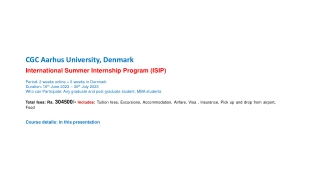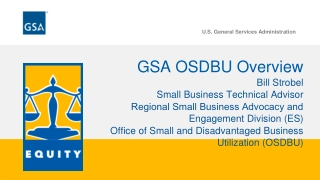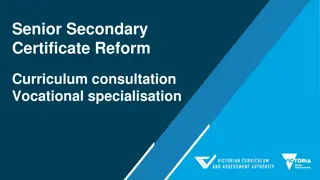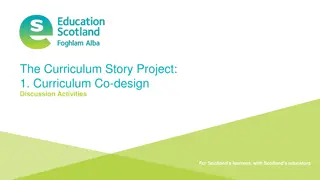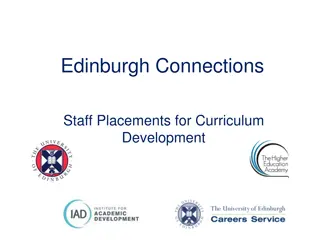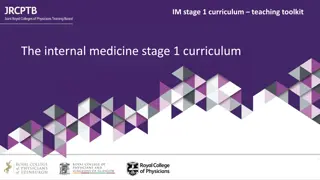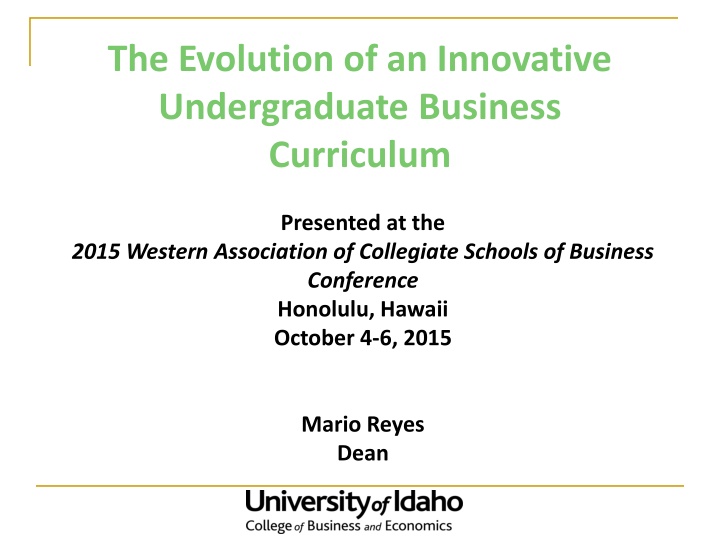
Evolution of an Innovative Business Curriculum
Presented at the 2015 Western Association of Collegiate Schools of Business Conference in Honolulu, Hawaii, this initiative led by Mario Reyes focused on transforming the undergraduate business curriculum through the integration of modules emphasizing team building, decision making, and business operations. The curriculum evolution process involved meticulous planning, data collection, and faculty collaboration, resulting in the implementation of the Integrated Business Curriculum (IBC) from 1994 to 2012. This interdisciplinary program provided students with a broad perspective of business practices, hands-on experience in self-managed teams, and enhanced communication skills. The IBC modules covered various aspects of business management, fostering a holistic understanding of organizational dynamics and decision-making processes.
Uploaded on | 3 Views
Download Presentation

Please find below an Image/Link to download the presentation.
The content on the website is provided AS IS for your information and personal use only. It may not be sold, licensed, or shared on other websites without obtaining consent from the author. If you encounter any issues during the download, it is possible that the publisher has removed the file from their server.
You are allowed to download the files provided on this website for personal or commercial use, subject to the condition that they are used lawfully. All files are the property of their respective owners.
The content on the website is provided AS IS for your information and personal use only. It may not be sold, licensed, or shared on other websites without obtaining consent from the author.
E N D
Presentation Transcript
The Evolution of an Innovative Undergraduate Business Curriculum Presented at the 2015 Western Association of Collegiate Schools of Business Conference Honolulu, Hawaii October 4-6, 2015 Mario Reyes Dean
CBE Advisory Board demand Graduates with a broad perspective of how businesses operate students in the traditional program did not have a systems perspective, or the ability to determine how actions in their functionally organized unit might impact other areas. Graduates with skills/experience in working in self-managed teams Graduates with effective written and oral communication skills
The Planning Process Data collection and analysis (1993-94) Focus group sessions with College s Advisory Board Benchmarking visits to other universities Focus group sessions with students Faculty retreats for discussion Summer 1994 planning session for team Jack Morris (P/OM) Dana Stover (MHR) Steve Pharr (Marketing) Randall Byers (IS, Quantitative Methods) Mario Reyes (Finance and International Business)
Integrated Business Curriculum (IBC): 1994-2012 Business Systems Product & Process Planning Team Building Planning & Decision Making Managing the Firm s Resources Business Operating Decisions
Integrated Business Curriculum (IBC): 1994-2012 17 credit/2 semester cohort program 6 modules based on business decisions and processes Team taught by 5 faculty members- different disciplines Required of all junior-level business and economics majors, thereby providing a common base for all business majors Broad perspective of business; exposure to business disciplines Teambuilding and group dynamics course module and faculty mentoring Team environment in and out of class Formal students presentations and lots of writing assignments All essay/problem exams Close ties to business with Case Firm Program
IBC Course Modules: 1994-2012 Second Semester First Semester Planning and Decision Making (2) Team Building and Group Dynamics (2) Managing the Firm s Resources (3) Business Systems (4) Product and Process Planning (3) Business Operating Decisions (3)
For Example: Finance in the IBC IBC Module Finance Topics Covered BUS 340 Team Building and Group Dynamics None BUS 341 Business Systems Financial Markets and Institutions Foreign Exchange Markets Risk and Return Time Value of Money Valuation BUS 342 Product and Process Planning Capital Budgeting BUS 343 Planning and Decision-Making in Organizations Financial Planning Pro Forma Financial Statements External Funds Needed BUS 344 Managing the Firm s Resources Cost of Capital and Capital Structure Dividend Policy Cash Management Models Inventory Models BUS 345 Business Operating Decisions Credit Standards Credit Policy Decisions
The Case Firm Program Adopt a case firm (3 year commitment) Faculty shadowing visits Executive for a day Student team projects
Assurance of Learning in the IBC: 1994-2012 CBE Learning Goal Measures Assessed by #1 Business Knowledge and Environment Embedded questions IBC Faculty, with rubric for some #2 Critical Thinking and Ethical Problem-Solving Embedded questions IBC faculty, with rubric for some #3 Communication Student presentations IBC Faculty team and CBE Assessment Committee with rubric IBC Faculty team and McCarthy Writing/Communication Lab mentor with rubric Module projects #4 Clarify Purpose and Perspective None to-date Not applicable #5 Teamwork and Collaboration Team problem-solving activity Department of Business Advisory Board with rubric Closing the loop: IBC Faculty Summer Camp CBE Faculty Retreat
Administration of IBC: 1994-2012 Faculty team formation Faculty recruiting Choose faculty with solid teaching performance Choose faculty who have demonstrated they can work in academic teams or who have been successful in interdisciplinary research Attempt to include SP/IP faculty in each faculty team Faculty teaching load Typical load per year: SA 5 courses; SP/IP 8 courses IBC faculty (steady state): SA faculty 2 sections of IBC + 1; 1 section of IBC + 2 SP/IP faculty 2 sections of IBC + 3; 1 section of IBC + 4 Rewards Stipend for IBC summer camp $15,000 one-year fellowships (2 awards) for IBC faculty
Other Benefits: IBC 1994-2012 Cohort experience == incredible networking Positive impact on college s scholarly activities Contributes towards the CBE s strategic goal of creating an intellectually stimulating and dynamic learning community that emphasizes teamwork and values the unique contributions of all individuals A sense of community Mentoring Improve teaching Impact on development efforts, internships, etc
Praise for the IBC: 1994-2012 From the corporate world Winner of the Idaho Quality Award for excellence Design and process reviewed by team of corporate auditors Criteria based on Malcolm Baldrige award From the academic world Winner of Distinguished Education Program Award (the Academy of Educational Leadership) integration of Accounting into the Business IBC
Challenges to the Delivery of IBC: 1994-2012 Cost of delivery Faculty burn-out Dwindling faculty champions for the program Perceived reallocation of resources to IBC Perceived adverse impact on the majors Scalability
The Evolution of the INTEGRATED BUSINESS CURRICULUM Fall 1993 Fall 1993- Summer Spring 1994 1994 Fall 1994 Fall 2012 1994-1996 Fall 2010 Fall 2002 Fall 1996 Spring-Su 09 Feedback from stakeholders and self-evaluation; Adjustments and improvements Stakeholder survey, and IBC revitalization Summer meetings Task force established to explore ways of attaining greater cross- discipline integration Pilot course dubbed as IBC2 is developed by a 5-person faculty team Revised IBC: 18- credit requirement for all CBE students 20-credit IBC2 is offered to 40 volunteer students Data collection 17- cr. IBC 1 cr. BUS339 2 cr. Econ 340 2-cr Acct 310 Re-engineered the curriculum in an environment of enrollment growth with lagging resources 17- cr. IBC 2 cr. Econ 340 2 2-cr Acct 310-311
Desired Outcomes of 2012-2013 IBC Re-engineering Scalability Cohort experience Team building/group dynamics Cross-functional business perspectives Maintaining the CBE innovative reputation
Features of the Re-engineered IBC Freshman Year Team building and group dynamics Introduction to the different business functions Introduction of cross-functional perspectives via business simulation Sophomore Year Leadership skills Junior Year Competency in core business functions Senior Year Integration Ethics and leadership
Hands-on Learning: Business Process Improvement Center Barker Capital Management and Trading Program US Bank Trading Floor Vandals Solutions Idaho|Entrepreneurs Career@CBE Financial Literacy VITA Vandal Hat Hacking Club
Continuing discussions: Ensure cross-functional perspectives and integration How to instill a cohort experience Assurance of learning plan
Ideas and Suggestions? Thank You!



